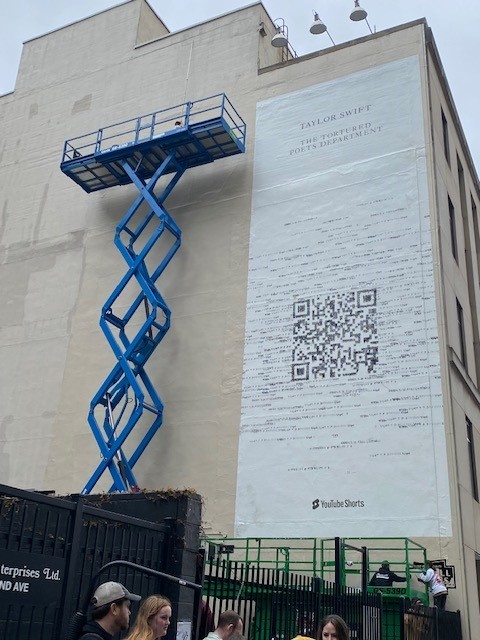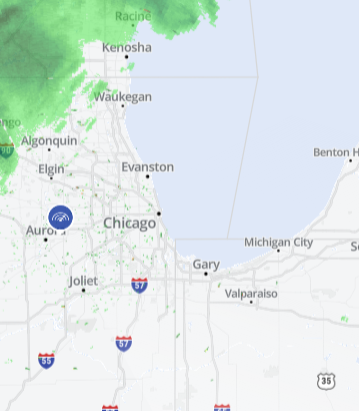Infamously, Borders was forced to shut down and liquidate all its stores earlier this year. It was the second-largest U.S. bookstore and nobody wanted to save it from bankruptcy. Thousands of people lost their jobs.
So who the hell opens a bookstore now?
Tanner McSwain, that's who. The North Carolinian has long called Chicago home, and while publishing has been a passion of his for years, it wasn't until Borders' demise that he realized the scene might actually be set for an indie-bookstore revival.
And it looks like he might be right: Uncharted Books, which he plans to open in mid-December in Logan Square, has already raised $11,080 on Kickstarter and continues to amass more funds to benefit the store. The goal was to raise only $10,000, and there's still two weeks to go.
I gave McSwain a call to get his take on what the bookstore landscape is like in Borders' absence, why anyone would open a bookstore in the digital age, and why he's so optimistic overall.
When did the idea pop in your mind and make you think you should go for it in Chicago?
Tanner McSwain: The idea that I should work in or own a bookstore has sort of always been pervasive. I love books, I've been working with books for a while. The last few years I've worked for publishers around Chicago. That was fulfilling in a lot of ways but it's also less hands-on than what I wanted it to be. Honestly, the Borders thing is kind of exactly when I said, "Oh, I should open a bookstore." When they started closing the Chicago locations back in the spring, I was working over at McGraw-Hill down in Burr Ridge and it just didn't suit me. I was looking for a way out, something else I could do that would still keep me involved in books.
I read all the publishing blogs, I do all that, and when I started reading about Borders -- I'm not an enemy of Borders. It was a bummer when it closed but I saw that as a huge opportunity. The playing field is suddenly a little more even for the indies.
Local
In the '80s, there were indie bookstores all over the place, before the rise of Borders and Barnes & Noble. When Barnes & Noble came around, Walden Books and all of that, they lowered their prices so the indies couldn't compete, and then as soon as everyone was driven out of business they jacked up the prices. That's why a paperback book costs $18 instead of $8. [Laughs.] They have publishers over a barrel.
Not to kick Borders when it's down, but when they were going out of business, it was refreshing to walk into those liquidation sales and see prices where they should've been all along.
Tanner McSwain: [Laughs.] They were, but even Borders' liquidation prices were too high for me. At least for the stock for the bookstore. And I've done a couple of interviews and I think everyone wants me to talk about how much I hate big-box stores and stuff like that.
Hopefully you're not getting that vibe from me. You guys are doing something completely different.
Tanner McSwain: No, I'm absolutely not at all. But my response to them has been that we're all on the same team: We all want people to read books. Whatever your definition of book is, that's good. I hate to kick Borders when it's down, because it is a bummer, and a lot of places like my hometown down in North Carolina, all we had was Borders. That's gone. Now there's no where to buy books [there]. So that sucks. But on the other hand, that means that indies suddenly have a place again, for the first time in a really long time. It's a little bit of an unknown quantity.
We don't know that this is going to be another indie-bookstore renaissance like we had 25 years ago. But it might be. I definitely want to get in on the ground floor of that. I want to do something that's different. Something you don't see too much. I think this is exactly the right time and place to do it. When I first came up to Chicago, I moved to Logan Square and I moved around some, but I always keep coming back here. It's my favorite neighborhood. They don't have a general bookstore here. We have a very good niche bookstore with Bucket Of Blood, but that's just horror, sci-fi, and fantasy. And unless you want to go all the way to Wicker Park for Myopic, you're kind of out of luck.
So it's going to be more that vibe than, say, Quimby's?
Tanner McSwain: Yeah, and I love Quimby's. Quimby's is certainly a store unlike anything else I've ever done. I wouldn't be able to -- it's not going to be like that. It's like Myopic in that it's general. We've got a little bit of everything. Certainly a smaller stock than Myopic. I think Myopic has something like 75,000 books. That's just not realistic for me. This is going to be much smaller, curated stock.
I've been following your website, and you mention getting big-deal authors like Neil Gaiman to tweet about you. But I was curious: Have any of the local bookstores we talked about reached out at all?
Tanner McSwain: Not really. I haven't really heard a lot from the other bookstores. Not in any official capacity, at least. I've had a few people who are employees from the other stores tell me good things. Again, I'm not really looking to compete too much. We all have our own specialty. I'm hoping this will be a relationship of cooperation, friendship.
Mutual respect.
Tanner McSwain: Yeah, mutual respect, exactly. I haven't heard anything from an official capacity, no.
You talked a little bit about why the time is right and why you like Logan Square, but can you describe what sort of research you did into why you chose that neighborhood?
Tanner McSwain: It's really just a neighborhood on the verge. It's been going through a lot of changes in the last few years. I really think with the Hairpin Lofts, with the renovations of the Logan Theater, if you walk down Milwaukee Avenue, there's dozens of storefronts with cardboard up in the windows. Something big is coming. Something big is definitely on the way. I just wanted to be in at the beginning of that.
I did do a fair amount of research. A lot of it came from talking to employees and managers at some of the local indies who would like to remain nameless. I did a lot of talking to local people, talking to a bookstore owner in New York. Open Books really helped me out a lot. I talked to a couple of guys who worked there and gave me really good advice. And of course a good amount of research online. A lot of my experience with publishing -- that gave me a window into a lot of this.
You've been raising funds on Kickstarter, which has so far exceeded your expectations. Can you explain why you decided to use Kickstarter, what you were expecting the reception to be like, and where you predict the Kickstarter will end?
Tanner McSwain: It definitely exceeded my expectations. This all started a couple years ago, when my friend Nick Disabato self-published a book called Cadence & Slang on Kickstarter. It was very successful. It paid for the whole thing, and what I liked about it the most was the idea of community. Through Kickstarter he met a lot of people in his field and people who were interested in this before he ever finished writing his book, before he launched, before anything like that. I want to do something similar with this. The main reason I wanted to do some fundraising through Kickstarter besides just needing the money is getting people excited about it before we open the door. I want to make it interactive already. I want to make it a thing that people talk about, which they have, shockingly. A lot. They really, really talk about it. I wanted it to be something that gives something away that gives something back in exchange for loyalty before we ever open the doors. That was the plan, to foster a community and enthusiasm for this.
That's been really successful. Our initial goal was $10,000 and that got funded in a little bit less than a week. It got funded on my birthday, actually, which was nice.
That's a nice present.
Tanner McSwain: It was a very, very nice present. I've gotten a lot of great feedback from backers, people in the area who have been really excited. I think by the end of this we can double it. Without too much trouble. And that extra is going to go towards making the store even better. Higher quality materials. Better rewards for the backers. All of that stuff.
If people are reading this now and are hearing about you for the first time or have already contributed to the Kickstarter, what else can they do to help out?
Tanner McSwain: We're also accepting donations of books already. You can send me an email or ask through the website. It's just a Tumblr, it's easy to do. Donations of books are great. I guess we're not going to buy books yet. [Laughs.] The other good thing is to just talk it up. Social media is great. Twitter, Facebook, and Tumblr, we have a presence on all of those. Twitter especially. We really love people participating. I'll answer your tweets and all your emails. Just spread the enthusiasm.



